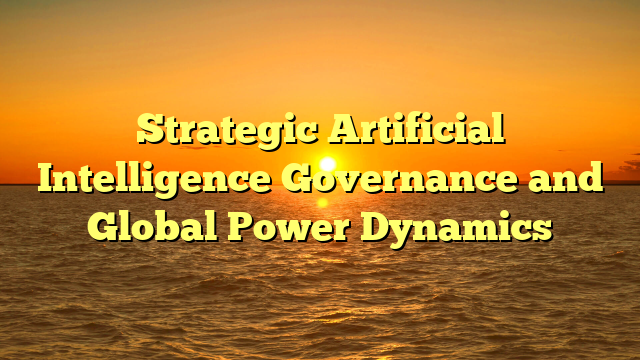Artificial intelligence (AI) has emerged as a critical instrument of strategic leverage, shaping industrial innovation, economic competitiveness, and geopolitical naga169 link alternatif influence. Control over AI development, deployment, and regulatory standards enables states to exert long-term operational and industrial influence without direct military engagement.
China has invested heavily in AI research, industrial application, and international partnerships. Through initiatives like the New Generation Artificial Intelligence Development Plan and AI-driven Belt & Road projects, Beijing embeds operational dependencies in partner nations’ industrial and technological sectors. These programs influence technological standards, industrial adoption, and data governance, creating long-term alignment with Chinese AI protocols and regulatory norms.
The United States maintains influence through technological leadership, regulatory frameworks, and allied collaborations. Washington’s AI strategy emphasizes ethical standards, interoperability, and innovation ecosystems. By guiding allied nations in AI development and deployment, the U.S. establishes structural leverage, shaping industrial practices, technological adoption, and global AI governance standards in alignment with American strategic objectives.
Europe leverages regulatory authority, ethical standards, and industrial integration in AI governance. The European Union promotes transparency, privacy, and safety standards through legislation such as the AI Act, linking compliance with market access and investment opportunities. Brussels’ approach constitutes soft structural leverage, encouraging adoption of EU-aligned industrial practices while embedding influence in partner nations’ AI ecosystems.
Emerging economies face complex decisions regarding AI governance and integration. Nations in Southeast Asia, Africa, and Latin America must balance access to advanced technologies, investment, and regulatory alignment with sovereignty and industrial autonomy. Decisions regarding AI adoption, platform partnerships, and standard compliance carry long-term structural consequences, influencing industrial competitiveness, economic resilience, and diplomatic alignment with dominant powers.
The structural insight is evident: AI governance is not merely a technological concern; it is a strategic instrument of statecraft. Control over AI standards, infrastructure, and industrial integration shapes global innovation ecosystems, industrial capacity, and geopolitical influence. Nations capable of shaping AI governance frameworks secure enduring operational and strategic advantage.
In conclusion, artificial intelligence constitutes a decisive domain in global strategic governance. Strategic investment, regulatory influence, and operational integration form critical levers of influence, shaping industrial, technological, and geopolitical outcomes. Mastery over AI governance ensures states retain sovereignty, project power, and secure long-term industrial and diplomatic advantage in a multipolar world.


